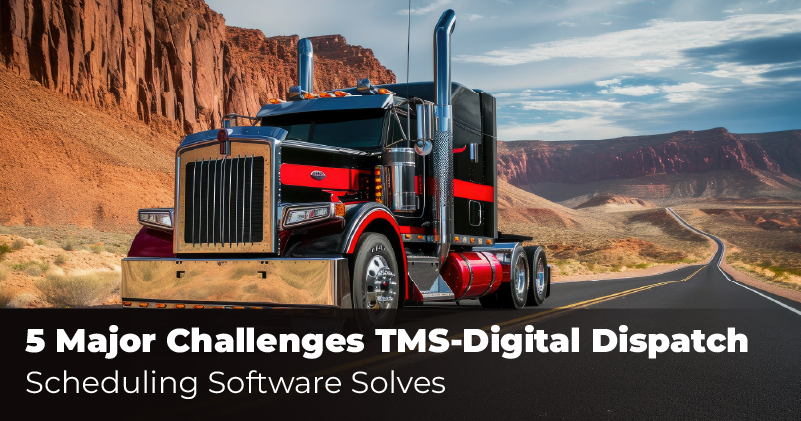
In the fast-moving world of logistics and transportation, efficient dispatch scheduling is the cornerstone of streamlined operations. Yet for many businesses, manual scheduling methods result in delays, rising costs, and underutilized resources. As logistics networks grow more complex, companies are seeking scalable, automated solutions to optimize their delivery operations. In this blog we’ll cover the 5 major challenges TMS-Digital Dispatch Scheduling Software solves —a powerful platform built to solve the industry’s most pressing challenges through automation, real-time visibility, and AI-driven intelligence.
What is Dispatch Scheduling Software?
Dispatch scheduling software is a digital tool designed to automate and optimize the assignment of vehicles, tasks, or drivers for delivery or service operations. It considers various operational parameters, such as route efficiency, vehicle capacity, customer deadlines, and driver availability to ensure smooth logistics coordination.
TMS-Digital’s dispatch scheduling system enables logistics teams to minimize delays, cut fuel expenses, and enhance delivery accuracy through smarter, data-driven decisions—all from a centralized, cloud-based platform.
Industry Challenges TMS-Digital Solves
- Complex Task Allocation
Dynamic task allocation remains a hurdle for many logistics providers. Last-minute changes, fluctuating order volumes, and manual errors often disrupt workflows. According to industry reports, poor task allocation can inflate operational costs by up to 20%.
TMS-Digital solves this by automating task assignments using AI-driven algorithms that consider vehicle load capacity, delivery priorities, and driver locations. This reduces allocation time by up to 40%, eliminates bottlenecks, and enhances delivery accuracy.
- Inefficient Fleet Management
Tracking fleet performance manually leads to high downtime, delayed deliveries, and maintenance oversights. Nearly 40% of logistics companies report challenges in real-time fleet monitoring.
With real-time GPS integration, TMS-Digital gives managers full visibility into vehicle locations, fuel usage, and driver activity. Predictive analytics help reduce fuel consumption and enhance asset utilization—improving overall fleet performance by up to 25%.
- Poor Route Optimization
Inefficient routing results in higher delivery costs and longer service times. A McKinsey study estimates that poor route planning contributes to 25% of delivery delays and increases fuel expenses by up to 30%.
TMS-Digital’s AI-powered route optimization engine adapts in real time to traffic patterns, weather disruptions, and road closures. This leads to 15–20% reductions in delivery time and significant fuel savings.
- Communication Gaps with Drivers
Effective driver communication is essential for on-time deliveries and safety. However, 38% of logistics firms cite poor communication as a major operational challenge.
TMS-Digital includes a built-in driver mobile app for two-way communication, live updates, and issue resolution. Dispatchers can instantly send new instructions, reroutes, or alerts, reducing idle time by up to 15%.
- Limited Scalability
Many legacy systems cannot scale with growing delivery volumes, especially during peak seasons. As demand grows, manual processes become a bottleneck.
TMS-Digital’s cloud-based infrastructure offers seamless scalability. Whether managing 10 or 10,000 deliveries a day, the platform scales to match business needs while maintaining 99.9% uptime—without the need for additional hardware or IT overhead.
Global Impact of Dispatch Scheduling Software
The dispatch scheduling software market was valued at $5.6 billion in 2023 and is projected to reach $9.1 billion by 2032. Cloud-based solutions account for 65% of this market, driven by their accessibility, flexibility, and lower total cost of ownership.
Small and medium-sized enterprises (SMEs) are leading the adoption curve, with a CAGR of over 12%. This trend reflects the increasing need for affordable, scalable solutions that enhance operational agility and customer service.
Driving Forces Behind Adoption
- Cloud Flexibility: Enables remote access and eliminates on-premise hardware.
- IoT Integration: Enhances visibility into assets and inventory.
- Global eCommerce Growth: Requires smarter, faster delivery orchestration.
- Environmental Compliance: Reduces fuel usage and supports carbon reduction targets.
Future Trends in Dispatch Scheduling
AI-Powered Scheduling
AI continues to redefine logistics by enabling systems to analyze vast datasets in real time. By 2030, the global AI market is projected to exceed $1.5 trillion, influencing every aspect of logistics planning.
Machine Learning Optimization
ML helps systems learn from past delivery patterns to continually refine schedules. According to Gartner, 50% of global enterprises will rely on real-time ML analytics for operational decisions by 2025.
Autonomous Vehicle Integration
As autonomous fleets gain traction, dispatch software must adapt. By 2035, 25% of all U.S. miles driven are expected to involve autonomous vehicles. TMS-Digital is already preparing for this shift by ensuring compatibility with autonomous dispatching logic.
Conclusion
TMS-Digital’s Dispatch Scheduling Software is a transformative solution for modern logistics operations. It addresses the five major industry challenges—task allocation, fleet visibility, route optimization, communication, and scalability—while equipping businesses with the tools needed to adapt to future demands.
Through cloud-based deployment, real-time updates, and AI-powered intelligence, TMS-Digital empowers logistics providers to increase efficiency, reduce costs, and deliver superior service.
Ready to streamline your dispatch operations? Book a demo with TMS-Digital and discover how our dispatch scheduling software can redefine the way you manage logistics.










